★★★★
Frank Capra and Barbara Stanwyck made a great team. He was one of the revolutionary directors who was thrilled to make the adjustment from silent to sound films, with the education and the technical know withal to think outside the box, paving the way for all of the followers lining up behind him. She was to become one of the greatest movie stars of all time, with Capra being the perfect man to give her career a lift at just the right moment. 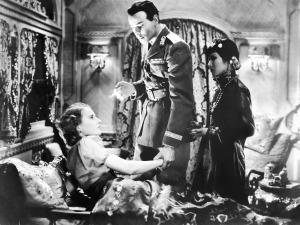 Not that she would really need help to become the icon that she did, but Capra’s films clearly got her there faster. Their first collaboration, “Ladies of Leisure” (1930), was only her third credited role, but it propelled her to the ranks of stardom- a status that she would never relinquish. They ended up making five films together, ending with what is probably their most watched film, “Meet John Doe” (1941). It is these first four, however- these “under-the-radar” pictures that are the more noteworthy and aberrant; particularly when considering the timing of their release. Sound films came on the scene in 1927, and by 1934 the Hayes Code was in full effect, leaving only seven years for the filmmaking pioneers to make talking films with the freedom in which great directors (including Capra) always seem to thrive. That is when Stanwyck and Capra got together to create these other four movies, which in addition to “Ladies of Leisure “, also included “The Miracle of a Woman” (1931), “Forbidden” (1932) and today’s topic,“The Bitter Tea of General Yen” (1933).
Not that she would really need help to become the icon that she did, but Capra’s films clearly got her there faster. Their first collaboration, “Ladies of Leisure” (1930), was only her third credited role, but it propelled her to the ranks of stardom- a status that she would never relinquish. They ended up making five films together, ending with what is probably their most watched film, “Meet John Doe” (1941). It is these first four, however- these “under-the-radar” pictures that are the more noteworthy and aberrant; particularly when considering the timing of their release. Sound films came on the scene in 1927, and by 1934 the Hayes Code was in full effect, leaving only seven years for the filmmaking pioneers to make talking films with the freedom in which great directors (including Capra) always seem to thrive. That is when Stanwyck and Capra got together to create these other four movies, which in addition to “Ladies of Leisure “, also included “The Miracle of a Woman” (1931), “Forbidden” (1932) and today’s topic,“The Bitter Tea of General Yen” (1933).
The story, based on the novel by Grace Zaring Stone, takes place in the 1920’s, during the height of the Chinese Civil War. A ruthless warlord, General Yen 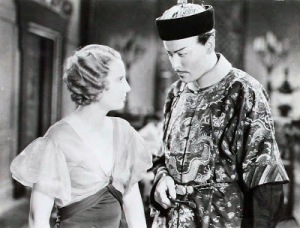 (Nils Asther), is in control of things in Shanghai. His situation only appears to be improving as his chief financial advisor (Walter Connolly) informs him that he was recently able to gather up six million dollars for Yen’s personal “war chest”.
(Nils Asther), is in control of things in Shanghai. His situation only appears to be improving as his chief financial advisor (Walter Connolly) informs him that he was recently able to gather up six million dollars for Yen’s personal “war chest”.
On the other side of town, safe from the fires that are destroying much of city, American missionary Bob Strike (Gavin Gordon) is about to get married to his childhood sweetheart, Megan (Barbara Stanwyck). She just arrived in China, and hasn’t seen her fiance in three years. Their wedding, however, has to be postponed as Bob feels morally compelled to travel into the hazardous zone to save a group of children stranded at an orphanage. Megan goes along with her soon to be husband, who first must stop by and see General Yen, in order to obtain a pass to make it safely through the war-torn area. Yen, however, does not comply, instead giving him a worthless piece of paper that he claims is a pass, thus guaranteeing the failure of their mission.
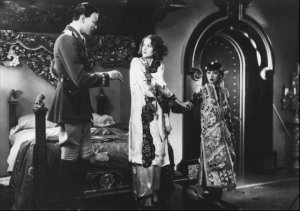 While trying to get the children to safety, Megan gets knocked unconscious while at a train station and becomes separated from Bob. She is seen, however, by General Yen who recognizes her from an earlier chance meeting. Yen takes her on his private train to his summer palace where she will “be safe”. When Megan awakens, she is being cared for by Yen’s concubine (Toshia Mori), who also happens to be a spy working against Yen. While staying at his luxurious home, Megan and Yen develop an unusual interest in each other. She becomes sexually attracted to him (including a particularly erotic dream). Yen begins to trust her blindly, even though he is aware that this trust is a bad idea.
While trying to get the children to safety, Megan gets knocked unconscious while at a train station and becomes separated from Bob. She is seen, however, by General Yen who recognizes her from an earlier chance meeting. Yen takes her on his private train to his summer palace where she will “be safe”. When Megan awakens, she is being cared for by Yen’s concubine (Toshia Mori), who also happens to be a spy working against Yen. While staying at his luxurious home, Megan and Yen develop an unusual interest in each other. She becomes sexually attracted to him (including a particularly erotic dream). Yen begins to trust her blindly, even though he is aware that this trust is a bad idea.
At times it’s melodramatic, at others down-right moving, but the interesting thing is that it doesn’t lack in any area. Frank Capra has created a masterfully woven story with his directing being some of the best from any of his early films. He shies away from nothing, as his camera boldly travels throughout the well designed sets to reveal a highly exhilarating and sexually charged drama.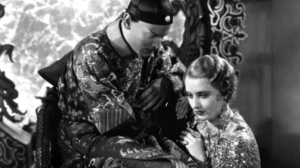 The costumes are magnificent, Edward Paramore’s screenplay is superb and the cinematography by Joseph Walker is inspiring, culminating into a full-service film watching experience.
The costumes are magnificent, Edward Paramore’s screenplay is superb and the cinematography by Joseph Walker is inspiring, culminating into a full-service film watching experience.
The acting in particular is spectacular, with Stanwyck being as brilliant in exactly the way we have come to expect. She seems to have an ability to take these basic, uncomplicated characters, and make them far more interesting and emotional than they would seem on paper. Swedish actor Nils Asther pulls off the villainous General Yen with the greatest of ease. He is brutal and cold, but after meeting Megan you can actually see the transformation occur, leaving him a vulnerable, unselfish man, with only remnants of his war lord life being remembered as vague recollections from days long forgotten. The show-stealer, however, is the elegant Toshia Mori, who with limited screen time manages to be Stanwyck’s equal- something that so many actresses would attempt to do from this point on. Mori didn’t continue to have a flourishing career in Hollywood, but not because of a lack of talent, as is evident when watching this movie.
Some directors have an emotional connection to their stars. This on-film “love affair” with their own personal screen goddesses always seems to work to the advantage of the beautiful ladies that become illuminated by the directors that worship them so much.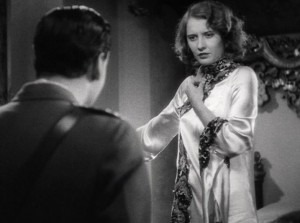 It worked for Greta Garbo and Clarence Brown, it worked for Marlene Dietrich and Josef von Sternberg, it worked with Grace Kelly and Alfred Hitchcock, and it worked for Stanwyck and Capra. His appreciation for her talent and beauty is what makes their films together so memorable and special. He takes every possible opportunity to showcase her to the audience. Because it was important to him, it becomes important to us- shaping her performance in each film (and her career) into something larger than life.
It worked for Greta Garbo and Clarence Brown, it worked for Marlene Dietrich and Josef von Sternberg, it worked with Grace Kelly and Alfred Hitchcock, and it worked for Stanwyck and Capra. His appreciation for her talent and beauty is what makes their films together so memorable and special. He takes every possible opportunity to showcase her to the audience. Because it was important to him, it becomes important to us- shaping her performance in each film (and her career) into something larger than life.
“The Bitter Tea of General Yen” is a patient film that focuses of the characters and their stories. It doesn’t try to do too much or be anything that it’s not. Perhaps that is why some find it to be slow-paced or dull. It is the subtle beauty of the film, however, made with a precision to capture a time, a place and the love of two people as realistically as possible that helps it succeed on all counts.

My first viewing of “The Bitter Tea of General Yen” was overwhelmingly devoted to Nils Asther’s performance which left me breathless. I always expect Miss Stanwyck to be perfect.
LikeLike
I haven’t had much experience with Asther in the past but was pleasantly surprised by what he brought to this role. I too always expect Stanwyck to be great, but find myself enthralled by the other performances (Asther, Mori and Connelly) as well.
LikeLike
Excellent review! I’ve got one of my own coming up tomorrow actually, but you hit a lot of the important points about the Capra/Stanwyck collaboration: there’s a real genuine feeling of the sensuous that you get from the movie that all of Stanwyck’s other films of the era lack. They brought out wonderful things in each other, and in this film and The Miracle Woman, they create these taught, beautiful little dramas that transcend the time they were made.
LikeLike
I look forward to reading your thoughts tomorrow. I also enjoy “The Miracle Woman” and look forward to revisiting that one soon. Their films together have an engaging quality to them, and I just can’t seem to get enough of their films. I only wish there were more.
LikeLike